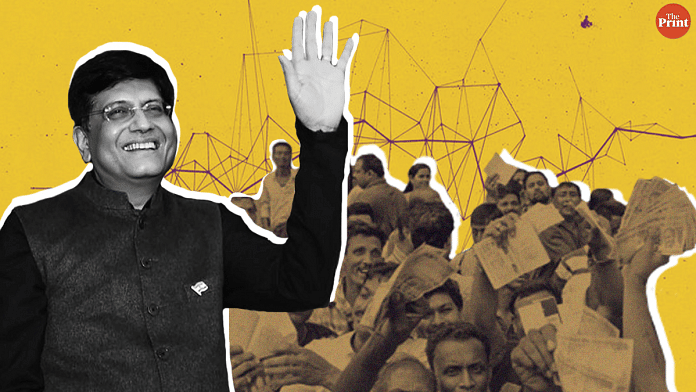Acting Finance Minister Piyush Goyal delivered the 2019 interim budget Friday.
The budget included several pre-poll promises such as income support for farmers, pension plans for the unorganised sector, and tax relief for the lower middle class.
ThePrint asks: Can 2019 budget revive economy & win back note ban/GST-hit voters or too little, too late?
Sops become fiscally unmanageable if their long-term soundness is not thought through
 Renuka Sane
Renuka Sane
Associate Professor, NIPFP
The interim budget has provided social security coverage for workers in the unorganised sector. A pension scheme has been promised that will provide an assured monthly pension of Rs 3,000 per month. The government has also promised a rural employment scheme.
In the short run, this might provide cheer to unorganised sector. Social security might smooth consumption for really poor households, and allow them to become entrepreneurial and take risks that might have benefits for the economy.
However, it is not clear what the mechanics of the schemes are going to be. In the case of pensions, for example, it is uncertain whether the defined benefit promise of Rs 3,000 in nominal terms is going to be adequate in old age, and whether the scheme is sustainable in the long run. Defined benefit promises become fiscally unmanageable if their actuarial soundness is not evaluated regularly – with implications for members and ultimately, for the taxpayers. There already exist schemes for similar functions – the MGNREGA for rural employment and the Atal Pension Yojna (APY) for pensions. These should instead have been strengthened.
2019 budget giveaways were not too little, but they were too late
 Sanjay Kumar
Sanjay Kumar
Director, CSDS
I am not so confident about saying that the Modi government budget will revive the economy, but I am far more confident in stating that the budget sops will have little impact in mobilising voters in favour of the BJP now.
It may not be too little, there are offers for the middle class, the poor and the farmers, but I think it has come too late. Enhancing the income tax exemption slab as an effort to appease the middle class would have limited impact – and not enough to change the electoral fortunes of the ruling party.
The reasons for this are simple. One, the salaried class constitutes roughly 6-7 per cent of all voters, and it will only impact this small percentage, at most.
There are a large number of young voters (roughly 16 per cent) who are either continuing their studies or are in search of jobs, enhancing the limit of income tax exemption would hardly have any impact on them.
It is also important to note that, today, a large number of Indian voters are polarised
in favour of one or the other party, they make up their mind on which party to vote for even before elections are announced. I doubt such an announcement would have a significant impact on their voting preferences.
With all these announcements, the BJP may be able to halt the trend of their declining popularity amongst the middle class, but it will be difficult to change their mind in a significant manner at this last minute.
Despite focus on rural development, allocation for the department saw a marginal increase
 Avani Kapur
Avani Kapur
Fellow, Centre for Policy Research
As election nears, the budget announcements of direct benefit transfer to small farmers, tax relief for the middle class and old age pension scheme for the unorganised sector, namely Pradhan Mantri Shram Yogi Mandhan, are not surprising. However, what has been missing is a clear strategy for rural development.
From the beginning, the present government has stated that its focus for the next few years is going to be on rural development and job creation through infrastructure generation. Yes, infrastructure has definitely been generated – many toilets have been built under Swachh Bharat Mission, many houses under the Pradhan Mantri Awas Yojana and roads under the Pradhan Mantri Sadak Yojana. Yet, the data for it and the linkage between infrastructure development and job creation are unavailable. The yet-to-be verified report of the National Sample Survey Organisation on unemployment gives a very different picture.
Despite a focus on rural development, allocations for department of rural development saw only a marginal increase this year. With the MGNREGS struggling with mounting liabilities in terms of payments due, the 2019-20 interim budget allocations, in fact, reflect a decrease from the revised estimates of 2018-19.
A paltry sum of Rs 17 per day is an insult to the farmer
 Salman Soz
Salman Soz
Member, Congress party and ex-World Bank member
This budget is a cynical and heartless attempt to gain votes.
In 2014 and 2015, the drought hurt the farmers badly. In 2016, the economy finally began to recover, but Narendra Modi went ahead and implemented the disastrous demonetisation. It is the poor who were left to face the most scathing repercussions of it.
In 2017, Modi brought in the GST and implemented it in the most horrible manner possible. It has damaged rural economy and businesses alike.
After causing damage and distress, this government has, instead of reaching out to farmers with a sustainable policy, decided to give them a paltry sum of Rs 17 per day. The move is nothing short of being slapped in the face.
It’s akin to saying, “We have severely damaged your livelihood, but forget about it and accept Rs 17 per day”. It is a huge insult.
Evidently, the BJP lacks empathy for the poor of this country. They will inevitably pay a heavy price for this blunder in the 2019 elections. I am certain people of India have made up their mind.
As far as the tax rebate is concerned, Mr Jaitley promised the same in 2014. Finally, after five years and just months before the next election, they decide to announce the proposal. It shows nothing but the BJP’s desperation.
The economy is in a state of crisis, and jobs are not being created. Narendra Modi is directly responsible for it. He will not be the next PM of this country.
Tax exemption limit for middle class will aid in reviving economy to some extent
 Radhika Pandey
Radhika Pandey
Consultant, NIPFP
In the pre-election budget, the government has made an attempt to please the farmers, the middle class and the informal sector. The attempts made by the government to address farmers’ problems have met with little success till now. The government recently announced an increase in the MSP for major crops to address farm distress but the discontent among farmers persist.
With direct cash transfers in their bank accounts, the government hopes to address the problems of small and marginal farmers, although there are always questions on whether Rs 500 per month is adequate to help them overcome the distress.
Post-demonetisation, the outlook on both consumption and investment demand had remained subdued. This was also manifested in the decline in household sector investment. The proposed income tax exemption limit for middle class will provide an impetus to demand and to some extent aid in reviving the economy. In the medium term, it may also encourage savings by households.
The monthly pension scheme of Rs 3,000 for the informal sector will benefit the unorganised sector workers who were the worst hit by the demonetisation move. However, to achieve a sustained growth revival, more needs to be done towards promoting private sector investment. On agricultural front, farmers would benefit from reforms aimed at efficient agricultural marketing.
By Fatima Khan, journalist at ThePrint. You can follow her on twitter @khanthefatima.



